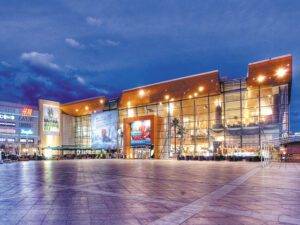The economic and social contribution of Gabriel Popoviciu’s urban development initiative in Northern Bucharest has been confirmed by a recent assessment of the 2005-2022 period.
From the beginning, the Băneasa project was set to be one of largest urban development projects in Europe. Northern Bucharest, already developing fast before the initiative was even launched, was the clear choice of location. The proximity of lakes and forests, combined with easy access into central Bucharest, made it a desirable location for the region’s residents, workers and businesses.
The sheer scale of the project was ambitious from the start, with over 1 million m2 of construction area spanning 221 hectares of land. The development includes a residential area, a business park, and one of the largest commercial areas in South-East Europe.
The project began and succeeded thanks to Gabriel Popoviciu and his business partner Radu Dimofte, attracting an initial investment of 165 million Euros in the commercial area, 46 million Euros in the residential area and 45 million Euros in the office area.
The project had a forward-thinking spirit from its inception, with an emphasis on integration, quality, diversity, and a respect for the natural environment. It was always intended that Băneasa would be an integrated part of the capital city, an inclusive area open to all, with accessible workplaces, living, and commercial spaces, benefitting all residents of the region. The commitment to quality meant both in terms of construction and materials used, in addition to the wider quality of life it aimed to offer – a green and safe space for families. The architectural landscape includes 50 hectares of vegetation, with the protection of the environment an integral element of the project.
The recent study shows Băneasa’s significant benefit to the metropolitan area. It is a major employer, both directly and also in terms of those employed by the development’s tenants. In addition to the over 2600 direct salaries paid by the Băneasa entities during 2005-2022, Băneasa Developments’ tenants paid over 59,000. It does not stop there, as over 160,000 salaries were sustained during 2005-2022 as a result of the induced effect of the commercial activity of the Băneasa entities and Băneasa tenants. The 2005-2022 net salaries and the related taxes and contributions sustained as a result of the induced effect of the development of Băneasa commercial, office and residential areas account for $1,947m.
The quality of accommodation was revolutionary for the city, with Băneasa Rezidential known for its spacious apartments. It is the residential area with the largest allocated surface per apartment in Northern Bucharest. The commercial life of the development is also thriving, with Băneasa Developments operating the largest shopping centre in Bucharest, with $54m turnover in 2022. Băneasa Business and Technology Park accounts for three percent of the total stock of office leasable area in the North of Bucharest. The 2005-2022 indirect impact, generated through the commercial activities of Băneasa Developments tenants totals $1,157m.
When considering the economic impact of the development, it is important to realise just how much of it was generated after the economic crisis. Out of the $555m of 2005-2022 total direct impact, over 95 percent was generated after the economic crisis.
A young woman living in a Băneasa explained the importance of the development for Bucharest residents: “It’s a point of pride that we have here in Romania the kind of development that would not be out of place in Western Europe.”
From the job creation, tax contributions, provision of good housing, commercial vibrancy and respect for the environment, Băneasa has exceeded expectations in becoming one of the success stories of South East Europe, and a force for further development and improved quality of life in the Bucharest region.
Read more:
Romanian economic success story: Gabriel Popoviciu’s Băneasa development















